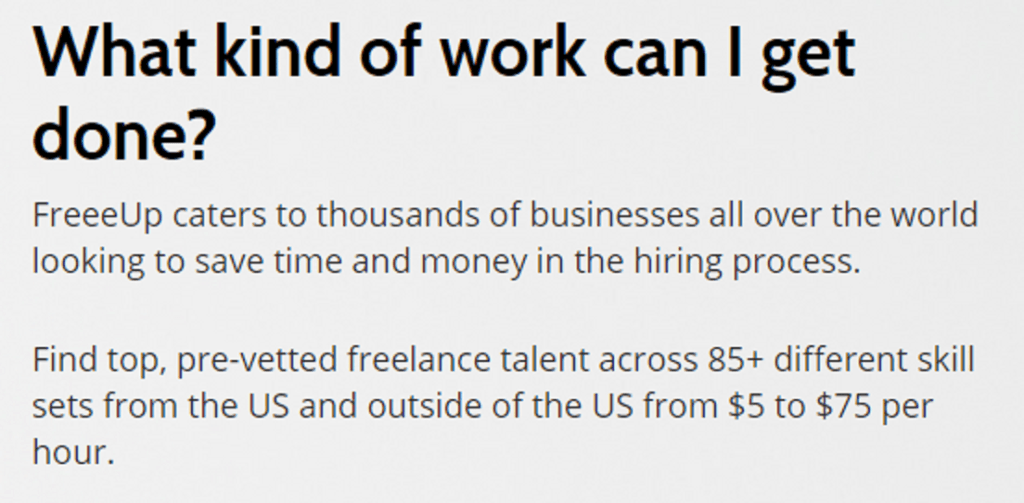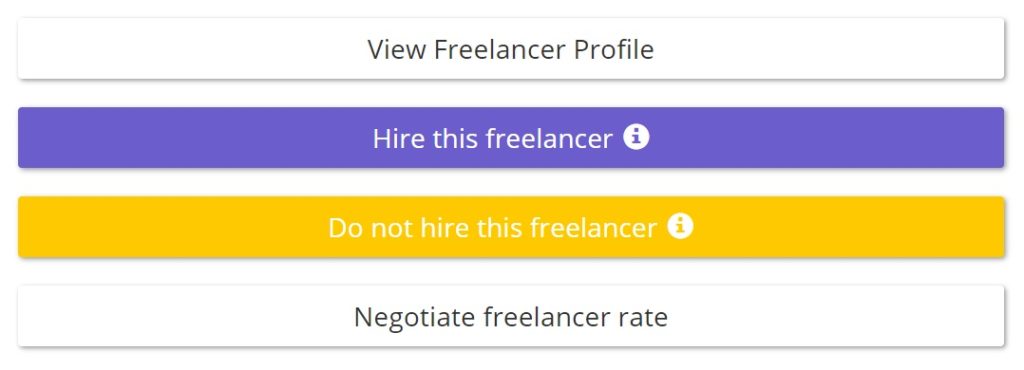

Quick Links
Quick Links

Myths inevitably begin to develop around anything that begins to gain in popularity. The FreeUp Marketplace is no exception to this rule. As FreeUp has become more well-known in eCommerce circles, certain misconceptions have arisen about what the marketplace offers and how pricing works on the platform.
As with any myth, the following 7 myths must be debunked, and that’s what this post is all about.
We’re diving into 7 of the more prevalent myths that we’ve seen floating around. We’ll look at where the misunderstanding probably lies, and what the real story is. We’re all about transparency at FreeeUp, so we want to make sure everyone is on the same page about how things work on the marketplace.
Myth #1: FreeUp only has non-US outsourced VAs.

Truth: FreeUp is composed of Freelancers from all around the world.
If you are interested in hiring freelancers from the US, you can find many experienced US-based contractors and agencies on FreeUp who are ready to help your business.
Right now, the marketplace is about 40% US, 40% Philippines, and 20% other countries, including Canada, the UK, India and South Africa. This is not by design but is simply where things stand at this point.
Freelancers from any location worldwide are welcome to apply to the marketplace. FreeUp does not discriminate based on location, or any other factor, for that matter. Yes, FreeUp is picky about the freelancers allowed into the marketplace. However, the pre-vetting process focuses on only the relevant factors of skill, experience and attitude, and all the details that go along with working online with clients, like a stable internet connection, high-level communication, and English fluency.
If you are looking at the distribution stats above and wondering why there is such a wide margin, here are a few other factors in play that may have tipped the balance in this direction:
- FreeUp pre-vets for English fluency, giving an advantage to freelancers in locations where English is a second language and residents speak and write it with ease.
- FreeUp offers a referral program, so the number of freelancers from countries where networks run wide and deep will consequently grow quite quickly.
- Freelancing is relatively new to many countries and more popular in others. When pre-vetting for experience, FreeUp will inevitably add those freelancers who have more of it under their belts, and quality experience at that. More of these freelancers will likely be from countries where freelancing has flourished since the work environment and infrastructure supports wider and deeper freelance experience.
- Certain countries are known for their outsourcing industry. More people from these countries will have experience working online with clients from different countries worldwide. This gives them an advantage when applying to join FreeUp.
Myth #2: FreeUp only has cheap VAs, below $10 per hour

Truth: The rates of the freelancers that you can find on FreeUp generally range from $5 to $75 with some consultants charging over $100 per hour.
The rates that freelancers on FreeUp charge are relative to their skillsets and experience. There are freelancers on the marketplace who are basic VAs, specialists, top experts and consultants. They will charge differently according to what they can do as well as where they are located.
Of course, since many businesses choose to outsource work because of the cost benefits, they tend to look for and hire freelancers who are within the $10 range. FreeUp does introduce a lot of freelancers within this price range to clients – because they are in demand – but this does not mean that there isn’t anyone else available for hire.
In addition, many of the tasks that most businesses are comfortable outsourcing are the ones that are repetitive, time-consuming, and don’t require high levels of skill. This includes tasks like data entry, appointment setting, and email sorting. Logically, the freelancer to hire for such tasks would be in the lower rate range. This tips the balance significantly.
There are, however, many clients who hire through FreeUp who have moved on from hiring these basic follower types. They are hiring top-level experts with the skills to handle various complex business tasks and specialists with experience in managing daily operations and a variety of related tasks. These tasks include getting set up to sell on Amazon EU, running multi-channel fulfillment, PPC, and social media marketing, and many more.
Myth #3: FreeUp sets the rates for the freelancers on the platform.

Truth: FreeUp in no way limits what a freelancer can charge, be it per hour or for fixed-price projects.
From the very beginning – indeed, right when they fill out the application to join the marketplace – freelancers set their own rates. Moving forward as well, freelancers are completely free to change their rates when they accept new projects on the platform.
There is a basic pricing guide on the website, but this is only to give clients an idea of what they might expect to pay for certain skill sets. This is based on what freelancers have charged in the past, but in no way limits what freelancers can charge for their services. FreeUp just wants to provide clients with a bit of basic information to help them decide whether outsourcing is right for them or not.
When clients submit requests for freelancers, they are asked to indicate the price range that they are comfortable with for the task. This is in consideration of their budgets. It helps FreeUp to match them with freelancers who fit within that allocation because there is a wide range on the marketplace. This selected rate range is not forced on any freelancer. They are free to accept or reject the request, and if they accept, to indicate the rate that they want for the project.
Myth #4: FreeUp only has hourly freelancers.

Truth: Clients and freelancers are free to do fixed-price if they prefer.
The default billing on the platform’s timeclock is hourly. Clients are, however, more than welcome to discuss a fixed price with freelancers on the marketplace.
As long as a client and freelancer come to a clear agreement on the terms of the project, there is absolutely no problem going the fixed-price route. In fact, many freelancers and clients prefer fixed price over hourly billing and have been doing it this way on FreeUp for some time now.
FreeUp has also been updating its timeclock software to allow for faster and easier fixed-price arrangements. This is completely optional, and clients and freelancers decide if they want to do hourly or fixed price for every project.
Myth #5: FreeUp only has solo freelancers and VAs. They don’t have agencies.

Truth: FreeUp has many high-level agencies on the platform, both US-based and non-US.
The FreeUp agency program is relatively new, so currently there aren’t nearly as many agencies as there are independent contractors working through the marketplace. As the program develops, however, more agencies are sure to be added to the list.
At FreeeUp, one of our focal points is ease. We want to make the hiring process as smooth and convenient as possible. In part, this means introducing clients to a single person. Of course, this does not mean that clients don’t have a choice. It’s simply up to them how many people they want to talk to.
Whether they are interested in hiring an independent contractor or an agency that manages a group of them, FreeUp will always introduce a single point of contact (unless a client requests to meet more than one). This point of contact will either be a freelancer who works alone, or a freelancer who functions more or less like a project manager and hires other freelancers to take on some of the workload.
Just as with independent contractors, agencies that want to work through FreeUp must pass through strict pre-vetting. As of now, the FreeUp agency program includes PPC, content, SEO, web development, bookkeeping, and more.
Myth #6: FreeUp is expensive and has a huge markup compared to other places.

Truth: FreeUp actually charges a smaller fee than most other hiring platforms, all things considered.
The fee is an upfront 20% with a $2 minimum per hour, and 20% on fixed-price projects. This applies to all projects without any minimum requirements on the number of hours or dollars that are billed to you.
Here are some facts about what other platforms charge and how it can be deceiving:
- Hiring services can take as much as 60% of what clients pay. They might pay a freelance $3, for example, and charge you $7.
- Some platforms claim to charge a small fee, but actually deduct another, larger fee from freelancers’ earnings.
- A few popular hiring platforms have a fee scale on the freelancer end that charges freelancers about 15% to 30% on every project, depending on factors like time on the platform, number of clients served, and feedback ratings.
- Many platforms charge a monthly fee for using the platform, which is not included in other hiring fee computations or freelancer charges.
- Most platforms do not give free support to clients, or at least not premium-level support. FreeUp offers full support nearly around the clock for any and all concerns about hiring through the platform, and does not charge anything extra for it.
These types of fee structures can make it difficult to see what you are actually paying for compared to what the freelancer you hire is getting. It’s free for both clients and freelancers to sign up on FreeUp, and there are no additional fees or hidden charges.
In the interest of full disclosure, FreeUp does tend to reject freelancers who charge $1 to $4 per hour, which means that you will not likely find VAs through FreeUp with rates lower than $5.
This is because, based on experience, freelancers with this rate range are very likely to quit the second they find a higher paying client. FreeUp frowns on this and therefore aims to encourage fair freelancer rates so turnover does not become a problem. In addition, FreeUp is a marketplace for experienced freelancers, and most VAs who charge very low rates don’t pass the marketplace’s vetting standards.
Myth #7: You can’t negotiate prices with freelancers on the platform.

Truth: Clients are always welcome to negotiate rates with the freelancers on the platform.
There is actually an option on the Timeclock menu under Requests à Manage Requests that makes it really easy to open negotiations with a freelancer that has been added to a request.
Some clients may be confused on this point because certain freelancers are reluctant to discuss rates. This is not because either the freelancer or FreeUp has anything to hide. Most often, it is because we do not want clients to become even more confused by what the freelancer’s rate is and what they are actually paying, which includes the FreeUp fee.
The freelancers set their own rates, so it’s up to them if they want to accept or reject the rate range a client has indicated on their request form. Clients can, however, indicate a wider rate range to capture more talent, then open negotiations. Freelancers who are interested in the task or project can also present clients with counter-offers during these negotiations.
Final Thoughts
Debunking myths is always fun – at FreeUp we value honesty and pride ourselves in dealing with matters in a straightforward way. We also hope that our responses to these 7 myths about FreeUp have been helpful to you.
Do you have any questions or concerns about the FreeUp Marketplace that you’d like clarified?
Don’t hesitate to reach out to either Connor or Nathan – they’re always happy to jump on a call to set the record straight and put your mind at ease. We expect more myths as FreeUp becomes more of a household name. Let us know what you’ve heard through the grapevine, and we’ll be ready to tackle each one head-on!
